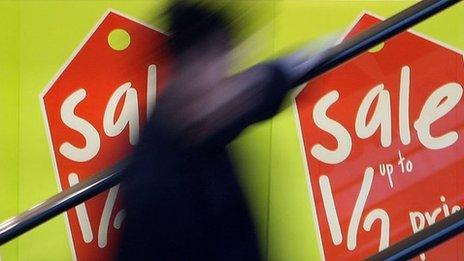Social buying boom attracts big-name investors
- Published

Daily discounts ensure customers keep on coming back for more
In a time when most people's inboxes are filled with spam e-mails offering supposedly "special deals", it would be natural to expect serious companies to steer clear of such annoying marketing efforts.
Yet in this murky sea of unwanted electronic communication, a fast-growing phenomenon has floated to the surface during 2010.
Social buying sites, such as Groupon, BuyWithMe and LivingSocial, offer discount deals on everything from sky-diving and fish pedicures to teeth whitening and restaurant meals.
During the last year or so, they have won over millions of sceptical customers in cities across the world and their expansion is set to continue at a rapid pace into next year.
Investor endorsement
The sites' ballooning customer bases have attracted major cash-injections from household names, with other eagle-eyed investors eager to get involved.

Vouchers are sold by social buying sites, which take a cut of the proceeds
Google recently had a $6bn (£3.9bn) offer for market leader Groupon turned down and is currently on the prowl looking for other social buying takeover targets - soon after it linked up with eBay for a cross-marketing initiative.
LivingSocial recently secured a $175m investment from Amazon, reportedly valuing the company at $1bn.
Social buying executives see investor interest as endorsement of their business model.
"It has legs and it looks sustainable," insists Eric Eichman, chief operating officer of LivingSocial.
'Media model'
Various social buying sites operate in slightly different ways, but they all deliver customers to retailers in return for a cut of the total revenue, and they build customer bases by offering good deals.
"We offer the consumer a great deal they can't get anywhere else and deliver the sales directly to the merchant," explains Rob Solomon, Groupon president and chief operating officer.
BuyWithMe says it "connects savvy shoppers with the best deals and offers from local businesses in their city", while Groupon says "collective buying" enables it to "offer deals that make it very difficult to say no".
"Think of it as a media model," says LivingSocial's Mr Eichman. "Customers will stay as long as the deals are good."
Daily discounts
LivingSocial's business model is typical.
The visible side of its business is easy enough to grasp. Localised daily e-mail offers go out to subscribers in 125 cities around the world. The discounts are valid for 24 hours, until the next e-mail is sent.
Customers tempted by a deal - for instance, a 53% discount on a River Thames speedboat tour - pay Living Social the £23 discounted price in return for a voucher.
"You're buying today, but you don't have to use the service tomorrow," explains Mr Eichman, pointing out that typically the voucher will be valid for a year.
LivingSocial will then pay the merchant directly, after taking a cut.
"We share the proceeds," Mr Eichman says.
That cut is basically the price that the merchant pays to get access to LivingSocial's customer base - though they only pay if customers actually buy something.
"It's the ultimate in performance-measured advertising," Mr Eichman insists.
'Customer acquisition'

Local companies use social buying sites to attract more companies
LivingSocial's cost side is equally simple.
It pays its 550 members of staff (up from just 10 a year ago) to develop and operate the technology - basically a website with a payment facility and daily e-mails to those on its database - and to sign up retailers and service providers willing to offer attractive discounts.
"Our mix of deals needs to be diverse enough to be interesting," says Mr Eichman. "If it's not a great deal, it's not going to work. And if it doesn't work, it's bad all around - for the merchant, for our members and for us."
Good deals on their own are not enough to build a large customer base, however.
In fact, explains Mr Eichman, "customer acquisition" - through advertising, for instance - represents the company's biggest cost.
"Once you build the list, you can get the merchants," he reasons, pointing to how it slowly creates a virtuous spiral.
Simple and lucrative

Social buying sites such as TownHog are expanding fast, though the market is increasingly competitive
Companies such as Google and Amazon could bring different things to the table.
As a retailer, Amazon could bring deals to customers, or a customer base to LivingSocial's merchants.
For its part, Google could bring loyal followers to sales-hungry retailers and service providers.
"Google has a strong relationship with consumers, but they don't have a commercial relationship with consumers," observes Mr Eichman.
So interest in the social buying outfits from large online operators is expected to grow dramatically in 2011 - a year when competition will probably also heat up as operators such as Groop Swoop, TownHog and eWinWin continue to expand, along with ever more new entrants.
Mr Eichman insists barriers to entry have already come up, with newcomers finding it difficult to sign up both merchants and customers.
But given that the business model is both simple and lucrative, it seems likely that many will have a go.
- Published23 December 2010
- Published11 November 2010